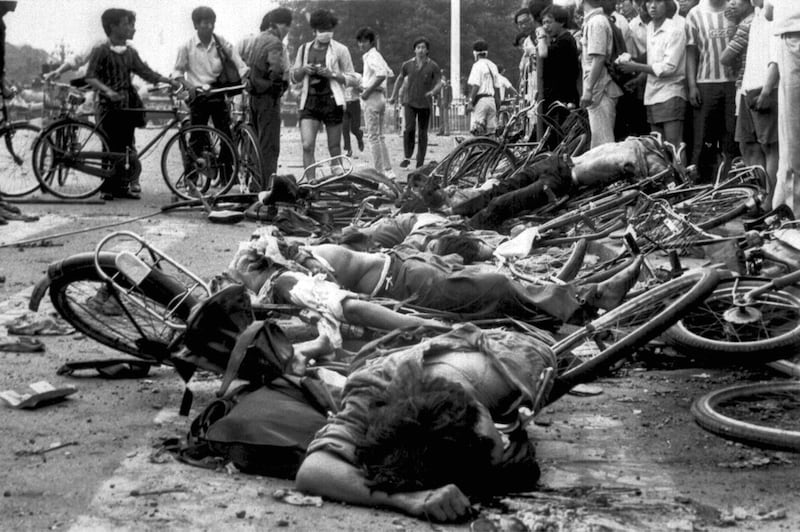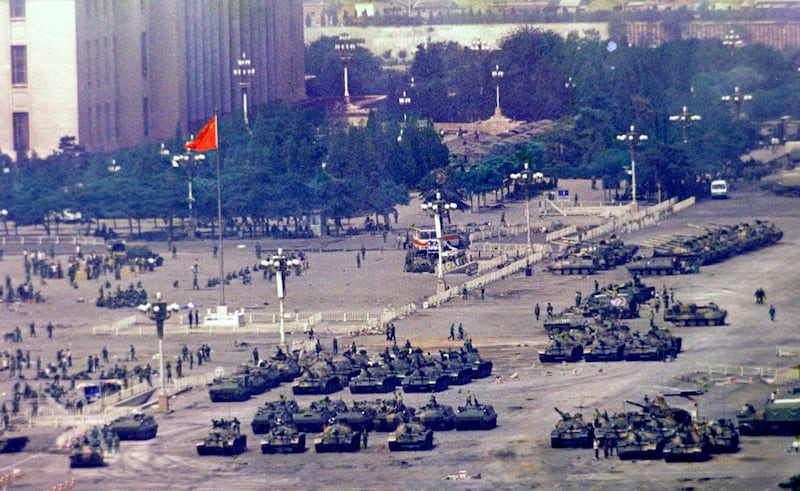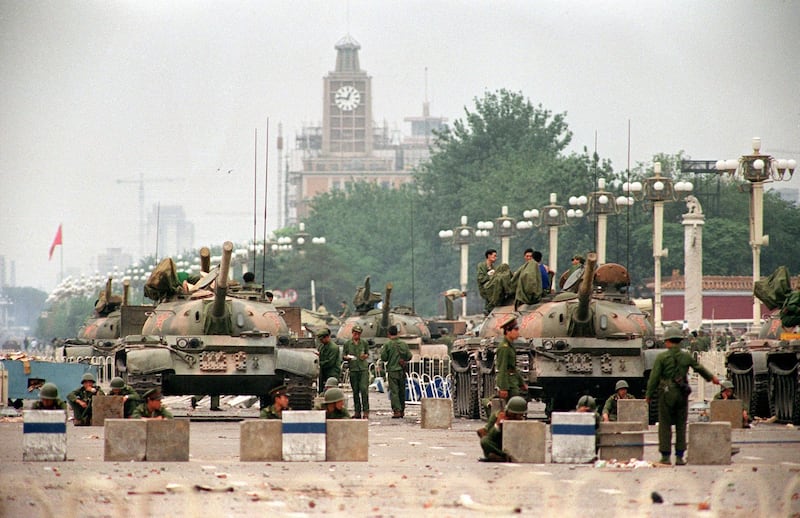In the second part of this two-part essay, Bao Tong, a former political secretary to late, ousted Chinese leader Zhao Ziyang, comments on then Premier Li Peng's accounts of the events leading up to the June 4, 1989 bloodshed by the People's Liberation Army that put an end to weeks of student-led protests on Tiananmen Square. An English-language version of the diary was published in 2010 as "The Critical Moment – Li Peng Diaries." Zhao was later removed from office and spent the rest of his life under house arrest at his Beijing home, dying in early 2005. Bao, who before the events of 1989 worked as director of the Office of Political Reform of the Central Committee of the Chinese Communist Party, served a seven-year jail term for "revealing state secrets and counter-revolutionary propagandizing." The 89-year-old Bao, a long-time contributor of commentary on a wide range of Chinese and international issues for RFA Mandarin, including a column titled "Under House Arrest," remains under close police surveillance in Beijing.
Now I think we need to take a look at what Zhao Ziyang did next. Zhao, of course, had no idea that the tangled web being woven by the chairman of the Central Military Commission, the president and the premier.
He just took Deng's "all agreed" and set to work implementing it. His schedule for May 14 and 15 was full, and he had a meeting with visiting Soviet leader Mikhail Gorbachev on the afternoon of the 16th.
Once that was over, Zhao hurried back to his office in Qinzheng Hall to call a meeting of the Politburo standing committee. He had finalized the agenda, which was to affirm the student protesters' patriotism and to retract the April 26 People's Daily editorial. Zhao didn't say or imply to the standing committee that Deng had agreed to the plan, but outlined his reasoning for the move. Li Peng made a few points against affirming the students' patriotism, then looked at Yang Shangkun and Yao Yilin, and saw they weren't very engaged. So he stopped trying to oppose the motion, and it eventually passed.
So it was that on the following day, all the major media outlets reported that Zhao Ziyang, on behalf of the Politburo standing committee, had affirmed the students' patriotism.
But the retraction of the People's Daily editorial remained a sticking point. Li Peng, Yao Yilin and Yang Shangkun were all adamantly opposed, saying that it couldn't be allowed because it would harm the image of Comrade Xiaoping. Zhao tried to reassure them by saying that the editorial was based on inaccurate reports made to Deng by standing committee members, so it should all be seen as coming from the committee. People would know that Comrade Xiaoping had supported us in making a correction of our own mistake, so the move wouldn't harm Deng, but rather enhance his prestige, Zhao argued.
Qiao Shi and Hu Qili made their support for Zhao's plan clear, while Li Peng and Yao Yilin were strongly against it. Yang Shangkun supported Li Peng's position, but he wasn't a member of the Politburo standing committee. According to the standing committee's rules of procedure, a majority vote holds sway. Three votes were for Zhao and two for Li Peng, so they could have gotten the resolution through. But they decided to keep talking just to be on the safe side.
This is why Zhao didn't request his next meeting with Deng until the morning of May 17.Deng said that was fine. Deng told Zhao to arrive at a specific time that same afternoon (I no longer recall the exact time) and not to be late. As soon as Zhao turned up, on time, Deng set his plan in motion.
The devil's in the details. But I have never read a detailed account of this endgame written by any of those involved. And I certainly don't set much store by the speculations of those who were not. All I have is Zhao Ziyang's personal account when he spoke to me and his secretary and deputy director Zhang Yueqi that same evening.
As I remember it, Zhao said: "There was a trial today. Yao Yilin has won everything. I have lost everything. I thought Deng and I were just talking privately. I didn't realize he had called a meeting of the standing committee. When I got there, they were all ready for me. Yang Shangkun was there too. Yao criticized my [May 7] speech to the Asian Development Bank, saying it was appalling, as it had struck two notes that weren't in keeping with Deng's line."
"Some decisions were made today. I can't tell you what they were, because they're classified."
I replied: "A decision is better than no decision. But I can't implement it."
"Deng told me that I'm still the general secretary," Zhao told us. "But when I got back, I thought some more about it, and I realized that I have to resign. So you need to draft a letter of resignation for me."
"From both posts?" I asked, referring to the general secretary of the CCP and the vice chairman of the Central Military Commission.
"From both posts," Zhao replied.

Deng's personal mantra
Incidentally, some details did emerge from the standing committee meeting called by Deng. I was told to be careful not to leak anything when I drafted Zhao's letter of resignation.
"That's easy," I said. "I never leaked a secret in my life."
"Someone is saying that you did," Zhao replied.
"That's got to be Li Peng, because the others would never say something so irresponsible," I said in anger.
"They're saying you have already leaked something," Zhao said.
I replied that there has to be some basis for such claims under the rule of law.
He said "I have a basis, but I won't talk about that until it's really necessary."
I finally found out that Li Peng had registered a complaint with the State Council that I, Bao Tong, had leaked details of a classified military decision made by the Central Committee's Politburo standing committee to the 13 researchers at the Central Political System Reform Research Group. In actual fact, those 13 people all testified that I had made no mention whatsoever of martial law, but instead had said I would be subjected to censorship, and asked them to abide by party discipline and keep quiet.
The stupid thing was that Li Peng himself had already leaked those particular military secrets to me himself on the afternoon of May 17, and would go on to use this as "evidence" that I was a bad guy. Indeed, "Bao Tong is a bad guy" was to become a personal mantra of Deng Xiaoping's.
But none of that made it into the official record. All it can do is serve as a joke on the Chinese Communist Party.
Moving on, I can be very sure of a few things, based on what Zhao Ziyang said to me and to Zhang Yueqi at the time.
Firstly, there was no mention of Zhao Ziyang throwing Deng Xiaoping under the bus in his meeting with Gorbachev, as has been widely supposed. Because Zhao's famous remark that "Deng Xiaoping may have retired from the Politburo standing committee, but he is still the supreme leader of the CCP" was a formal part of party policy. It was formalized in a resolution made by Li Peng on July 7, 1987. Li had already outed Deng and his role in party governance two years earlier, so how could Zhao have outed him a second time on May 16, 1989?
Secondly, the main attack dog, Yao Yilin, had clearly been selected and trained by Deng Xiaoping himself. Yao Yilin was in a difficult position. Deng Xiaoping had called him in to deal with Zhao on May 17 after boxing his ears over something that happened on May 8.

A struggle for power
Yao Yilin rarely called anything good, but he did call Zhao Ziyang's May 7 Asian Development Bank speech good, because it truly was impeccable.
On May 8, before the Politburo standing committee had formally convened and people were just chatting, Yang Shangkun told Zhao: "Great speech yesterday, Ziyang!"
Yao Yilin was the first to chime in, adding: "Nice speech, nice speech!"
Li Peng, not to be outdone, said: "I was with a foreign guest recently who said the same thing."
We could probably have looked all of this up, had the Politburo standing committee records for May 8 not been destroyed.
The standing committee under Yang Shangkun, were unanimous on May 8 in approving of Zhao Ziyang's alternative voice. But by the time we get to May 17, under the personal chairmanship and core leadership of Deng Xiaoping, the majority were denouncing him.
How to explain this? This is how it goes under the supreme leadership of the CCP Central Committee.
Well, that's nearly all, folks. There are just a couple more important questions I need to address.
The first question is "was it wrong of the students to gather in large numbers to express their ideas?"
I can tell you with a clear conscience that it definitely wasn't. Their rights should have been protected by the state and government, and by the army and police, not suppressed or destroyed by them. I will die on this hill, and I'm not going to change my view, whether it gains any traction or not. The student-led mass popular protests of 1989 are the thing I am most proud to have experienced in my entire life. A power struggle is just that -- a struggle for power. To succeed is to be defeated. Good and evil, right and wrong, are another matter. Power gained by evil means is still evil. And just demands that result in a massacre are still just.
The second question, and it's a very good one, is this: "Had Zhao Ziyang appeased Deng Xiaoping, could the massacre have been averted, or losses reduced?
It seems to me that if Zhao had given in to Deng, then instead of a massacre ordered by Deng Xiaoping, we would have had a massacre ordered by Zhao Ziyang. History would have been rewritten, people's suffering would have been made comprehensible, and less damage would have been done to the progress of reform. But Zhao Ziyang was always destined to lose in any power struggle. His ouster was entirely in keeping with Mao Zedong's moves against Liu Shaoqi. Anyone leaning to the right was accused of appeasing the capitalists. Too far to the left, and they were acting like a leftist to hide their rightist views. Liu was told to instigate the Cultural Revolution in universities. If he didn't send a team, he was enabling student attacks to impinge on the party. If he did, he was told that no good would come of suppressing them. They'll rectify you to death in this party. This is the legacy of Mao Zedong. Deng was merely an apprentice of Mao's.
And another important thing: a close friend of mine told me that in early 1989, Wang Feng, then United Front Work minister under the CCP Central Committee, told some prominent democrats that Deng was planning to have the "four insists" deleted from the Constitution. I can personally attest that Deng Xiaoping really was saying such things at that time.
I have concrete evidence of it. In early 1989, Marxist philosopher Hu Qiaomu deliberately disclosed this good news not only to Zhao Ziyang, but also to me. I have absolutely no doubt that Deng Xiaoping said these words to Hu Qiaomu, Wang Feng and others in early 1989, just as I have no doubt that Deng Xiaoping still swore that everything in the [reform-minded] 13th Party Congress work report still stood, even after the Tiananmen massacre.

Countless layers of CCP control
As for how reliable a source Li Peng's diary is, the fact that it was banned from publication in China by the Central Committee is enough to confirm that it was actually written by Li, that it is genuine, and not a fake.
All of the above pales into insignificance when compared with the events of June 4, 1989. The blatant deployment of 200,000 uniformed national defense troops armed with tanks and machine guns to crush and rake peaceful student and citizen demonstrators was an unprecedented achievement for Deng Xiaoping at the helm of the CCP. It set a new and historic low for human behavior. It gave the bloody lie to Mao's claim that no good can ever come of suppressing students. And it has even garnered a certain amount of praise, both inside China and overseas.
The Tiananmen massacre was a groundbreaking moment in history. It ushered in a new era of absolute impunity and the total loss of civil rights. The massacre helped to found the current "core" system in which everyone is expected to be of one mind, in the world's most populous country.
To use Deng's own words: "When Mao was alive, what he said went. Now he's dead, what I say goes. In future, it'll be [Jiang Zemin]."
It's how the current system was set up. The massacre paved the way for countless layers of CCP control, from national government to the urban police, or chengguan, and the auxiliary police, to ordinary people and dissidents governed as "special households," and for the mantra "Follow the party and prosper: oppose it and die" to be encoded into the minds of all Chinese citizens.
Mao's ideal was to transform the country into a military camp that directs all operations. But the June 4, 1989 massacre meant that there was no longer any need to direct anyone. Everyone was transformed into a self-disciplined and self-aware, battle-ready army and industrial workforce, in perfect step with the party. Who could withstand 1.4 billion people of one mind? Since then, the CCP's sickle has risen to lead the world in prosperity, wealth and power. Yet leeks [ordinary, powerless citizens] are also growing and spreading everywhere. As China grows greater and mightier still, the lead conspirator behind the Tiananmen massacre is honored as "Grandfather Deng."
This isn't a dream. It's a delectable reality, reaching out to admirers all over the world.
Translated and edited by Luisetta Mudie.
